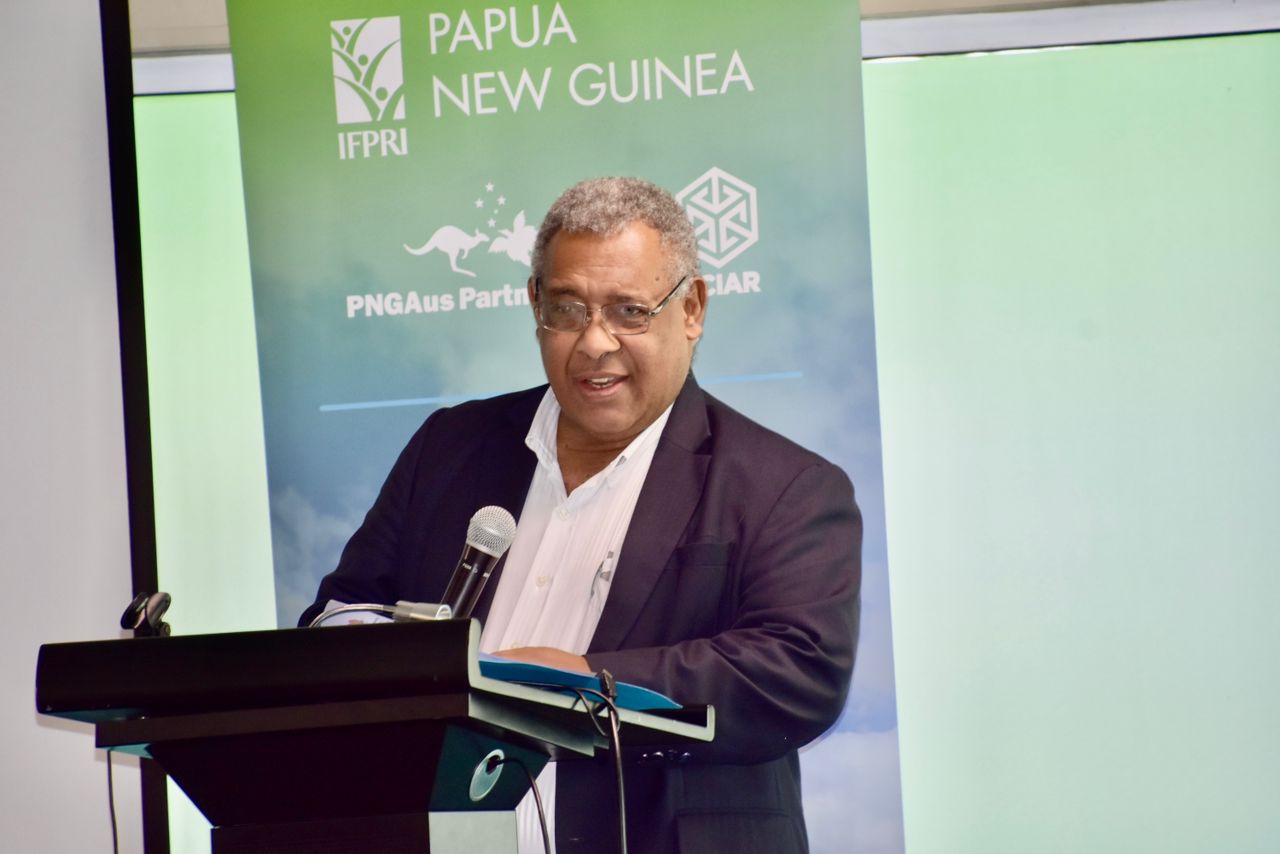It gives me great pleasure to be here today to give the closing remarks.
Allow me at the outset, to inform that Government acknowledges IFPRI’s ongoing excellent work in the country in terms of research as well as building the capacity of officers from various government departments and agencies to enhance their skills to analyze data from surveys that are undertaken to inform, support and complement evidence-based policy and decision-making.
Additionally, I would like to make special mention of Dr. Emily Schimdt, IFPRI’s Senior Research Fellow and PNG Country Program Leader, who has been very instrumental in ensuring that vital data is collected through various surveys undertaken in collobaration with NARI, DAL, FPDA, NSO and other key agencies.
As we all know, effective data collection and collation is a critical tool for policymakers and development partners to make informed decisions that can lead to better development outcomes.
In PNG, we face numerous challenges in rural areas, including poverty, food insecurity, and lack of access to basic services. To address these challenges effectively, we need to have accurate and up-to-date data on the situation of rural households and IFPRI’s support is timely.
Unfortunately, PNG has long been plagued with a lack of proper data infrastructure and this has limited our ability to monitor progress towards our development goals. This extends to include underlying issues such as food security, income-generating activities, access to basic services, and social networks.
The agriculture sector is the backbone of the PNG economy and remains a primary focus of the PNG government. Identifying the key entry points to enhance agriculture productivity is critical to building strategic policy and investments that will result in an agricultural transformation throughout the country, this is where IFPRI’s intervention is invaluable.
While primary agriculture, such as farming, fishing and forestry sectors make up about 18% of total GDP, the agri-food system, which includes primary agriculture, as well as handling, processing, transport and trade of agricultural goods in the country accounts for over 25% of GDP and employs over half of the PNG population. Agriculture is important to PNG’s economic growth.
We have seen today that while agricultural transformation starts on the farm, with increases in productivity, farmers eventually produce a surplus, therefor it is important to establish supply chains to link to markets, and create jobs and activities for food traders and wholesalers in local markets.
Dynamic market conditions generate demand for agriculture, and this demand creates greater job opportunities that are more focused on commercialized agriculture, including specialized handling, processing, transport, and marketing of agricultural goods.
Assuming the correct market conditions and a supportive agricultural environment, a strong agri-food system can create a virtuous circle of agricultural and economic growth from rural farmer to urban consumer, both domestically and abroad.
Building upon the last 5 years of engagement in PNG, the IFPRI team has successfully implemented the most comprehensive rural livelihoods survey since the 2009/2010 Household Income Expenditure Survey.
The IFPRI survey data presented today in this seminar represents an important example of data-driven analysis that can inform agriculture priorities in different parts of the country. Ongoing analysis and data collection to inform policy and investments in the agriculture sector will be critical to identifying opportunities to support an agricultural transformation within the country.
Furthermore, the NARI and FPDA discussions provided insights into how we can support our farmers to achieve greater productivity. Their dedication to informing farming and marketing processes is important to building strong farming systems that ensure food and nutrition security, while also supporting a greater agricultural commercialization agenda.
I would like to thank our esteemed guests for joining this seminar and participating in this important conversation on how to support our farmers, build strong agricultural systems, and support overall economic growth in PNG. I also want to thank the Australia Department of Foreign Affairs and Trade for their commitment in supporting the IFPRI work here in PNG.
In closing, I would like to inform you all that government through my Department and DAL are working closely with the Department of Foreign Affairs, to ensure AID DESIGNATED Status is fully accorded for IFPRI’s request to establish a resident office is facilitated.
Do we need IFPRI here? Yes we do!
Therefore I call on other line department and agencies to support and utilize IFPRI’s services.






